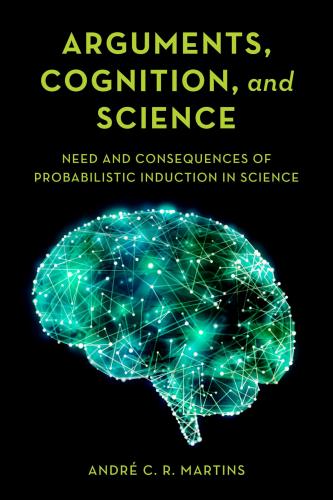Arguments, Cognition, and Science. André C. R. Martins
section>
Arguments, Cognition,
and Science
Arguments, Cognition,
and Science
Needs and Consequences
of Probabilistic Induction
in Science
André C. R. Martins
Published by Rowman & Littlefield International Ltd
6 Tinworth Street, London, SE11 5AL, UK
Rowman & Littlefield International Ltd.is an affiliate of Rowman & Littlefield
4501 Forbes Boulevard, Suite 200, Lanham, Maryland 20706, USA
With additional offices in Boulder, New York, Toronto (Canada), and Plymouth (UK)
Copyright © André C. R. Martins, 2020
All rights reserved. No part of this book may be reproduced in any form or by any electronic or mechanical means, including information storage and retrieval systems, without written permission from the publisher, except by a reviewer who may quote passages in a review.
British Library Cataloguing in Publication Data
A catalogue record for this book is available from the British Library
ISBN: HB 978-1-78661-507-7
Library of Congress Cataloging-in-Publication Data
Library of Congress Control Number: 2020931528
ISBN: 978-1-78661-507-7 (cloth : alk. paper)
ISBN: 978-1-78661-508-4 (electronic)
To my parents
Contents
6 Probabilistic Induction and Its Limits
8 Dangers of Deciding on Ideas
9 Theories and Philosophy of Science
11 Ideas, Opinions, Theories, and Facts
16 Arguments in Humanities, Biology, and Mathematics
17 Complex Systems, Emergence, and Realism
We reason. And we believe we are good at it. We feel our reasoning helps us get closer to good answers. At times, it does that. But we also make mistakes. And quite often, it seems we are unable to notice our mistakes. Too often, we find deep disagreements on matters of principle and on descriptions of how the world works. No matter how hard we try, sometimes we never reach consensus. Each side will tell everyone why their opponents are wrong. But the defenders of both positions almost never see their own mistakes. Nor do they acknowledge matters where the opposing side might be correct. In those situations, it seems our reasoning skills might be failing us. Or, as most people would see it, the reasoning skills of the defenders of the other side are failing them.
We try too hard to defend our points of view. Why we do that is a fascinating problem, but most of us pay too little attention to it. Why can’t we admit we might be wrong? What drives us to stick to ideas, beliefs, ideologies? The small group of us known as scientists are usually taught that science is a great tool to find correct answers. But disagreement is also common in scientific matters. When that happens, discussions can follow the same pattern of defense as in any other human activity. There seems to be mechanisms in science that help us to trade one point of view to another. But those mechanisms seem not to operate as fast as we would like. There is even an old notion that science advances because elder scientists retire, allowing new ideas to become prevalent.
The mechanisms of our cognition and when it fails have been studied for a while now. A more complete picture of our limitations and mistakes has been emerging recently. Meanwhile we have been working on normative tools. Those tools should be able to tell us how we should reason. They are based on logic, mathematics, and probability. They are actually quite complete, if one could forget the problem that makes them impossible to use. Still, we can learn a lot from ideal cases. At the very least, ideal cases can provide a direction in which we need to go if we want to get closer to their impossible results.
In this book, I will describe how we reach conclusions, and I will discuss how we might do that better than we do. The book is also about our mistakes and the tools we can use to try to avoid them. It describes current research on human reasoning and our logical tools. It shows what those recent results mean for our beliefs as well as how we make science. The main conclusion is that we have no known way to choose correct ideas about the real world. We can only rank them as more or less probable (when that is possible). Despite all our achievements, there is still a lot to understand about the consequences of not knowing which ideas are actually right. But it is not only a case of understanding those consequences. From a cognitive point of view, beliefs can often become quite problematic. From a logical point of view, beliefs have no grounds. They cannot be logically justified, and they harm our ability to reason. Those realizations have important consequences for scientific practice. And they help us better understand some epistemological questions about acquisition of knowledge and theory evaluation.
We
